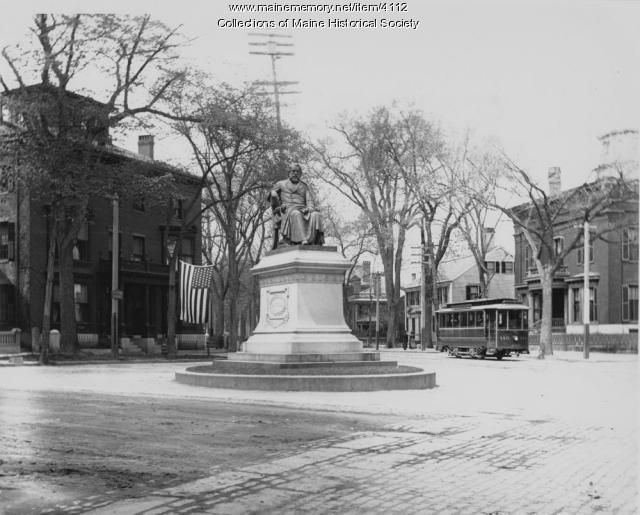Keywords: Myths
- Historical Items (13)
- Tax Records (0)
- Architecture & Landscape (0)
- Online Exhibits (4)
- Site Pages (4)
- My Maine Stories (1)
- Lesson Plans (3)
Lesson Plans
Your results include these lesson plans. Your results include these lesson plans.
Lesson Plan
Maine's Acadian Community: "Evangeline," Le Grand Dérangement, and Cultural Survival
Grade Level: 9-12
Content Area: English Language Arts, Social Studies
This lesson plan will introduce students to the history of the forced expulsion of thousands of people from Acadia, the Romantic look back at the tragedy in Henry Wadsworth Longfellow's famous epic poem Evangeline and the heroine's adoption as an Acadian cultural figure, and Maine's Acadian community today, along with their relations with Acadian New Brunswick and Nova Scotia residents and others in the Acadian Diaspora. Students will read and discuss primary documents, compare and contrast Le Grand Dérangement to other forced expulsions in Maine history and discuss the significance of cultural survival amidst hardships brought on by treaties, wars, and legislation.
Lesson Plan
What Remains: Learning about Maine Populations through Burial Customs
Grade Level: 6-8
Content Area: English Language Arts, Social Studies, Visual & Performing Arts
This lesson plan will give students an overview of how burial sites and gravestone material culture can assist historians and archaeologists in discovering information about people and migration over time. Students will learn how new scholarship can help to dispel harmful archaeological myths, look into the roles of religion and ethnicity in early Maine and New England immigrant and colonial settlements, and discover how to track changes in population and social values from the 1600s to early 1900s based on gravestone iconography and epitaphs.
Lesson Plan
Longfellow Studies: An American Studies Approach to Henry Wadsworth Longfellow
Grade Level: 6-8, 9-12
Content Area: English Language Arts, Social Studies
Henry Wadsworth Longfellow was truly a man of his time and of his nation; this native of Portland, Maine and graduate of Bowdoin College in Brunswick, Maine became an American icon. Lines from his poems intersperse our daily speech and the characters of his long narrative poems have become part of American myth. Longfellow's fame was international; scholars, politicians, heads-of-state and everyday people read and memorized his poems. Our goal is to show that just as Longfellow reacted to and participated in his times, so his poetry participated in shaping and defining American culture and literature.
The following unit plan introduces and demonstrates an American Studies approach to the life and work of Longfellow. Because the collaborative work that forms the basis for this unit was partially responsible for leading the two of us to complete the American & New England Studies Masters program at University of Southern Maine, we returned there for a working definition of "American Studies approach" as it applies to the grade level classroom. Joe Conforti, who was director at the time we both went through the program, offered some useful clarifying comments and explanation. He reminded us that such a focus provides a holistic approach to the life and work of an author. It sets a work of literature in a broad cultural and historical context as well as in the context of the poet's life. The aim of an American Studies approach is to "broaden the context of a work to illuminate the American past" (Conforti) for your students.
We have found this approach to have multiple benefits at the classroom and research level. It brings the poems and the poet alive for students and connects with other curricular work, especially social studies. When linked with a Maine history unit, it helps to place Portland and Maine in an historical and cultural context. It also provides an inviting atmosphere for the in-depth study of the mechanics of Longfellow's poetry.
What follows is a set of lesson plans that form a unit of study. The biographical "anchor" that we have used for this unit is an out-of-print biography An American Bard: The story of Henry Wadsworth Longfellow, by Ruth Langland Holberg, Thomas Y. Crowell & Company, c1963. Permission has been requested to make this work available as a downloadable file off this web page, but in the meantime, used copies are readily and cheaply available from various vendors. The poem we have chosen to demonstrate our approach is "Paul Revere's Ride." The worksheets were developed by Judy Donahue, the explanatory essays researched and written by the two of us, and our sources are cited below. We have also included a list of helpful links. When possible we have included helpful material in text format, or have supplied site links. Our complete unit includes other Longfellow poems with the same approach, but in the interest of time and space, they are not included. Please feel free to contact us with questions and comments.




